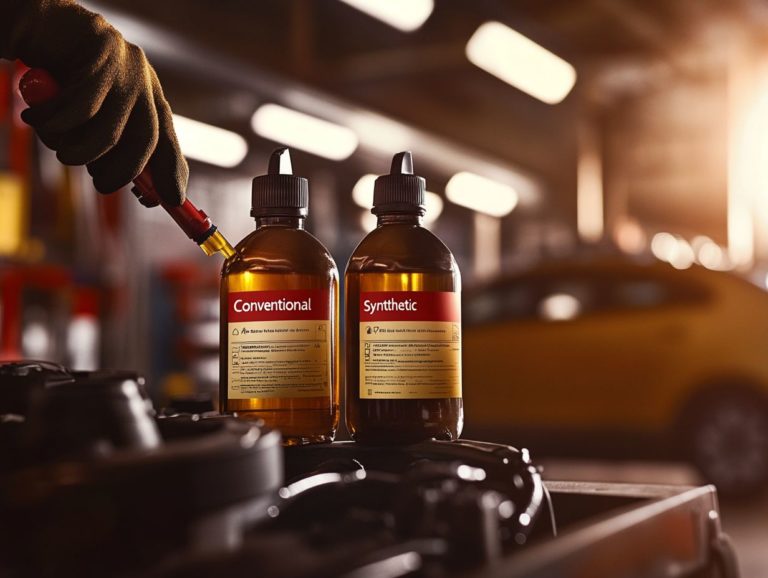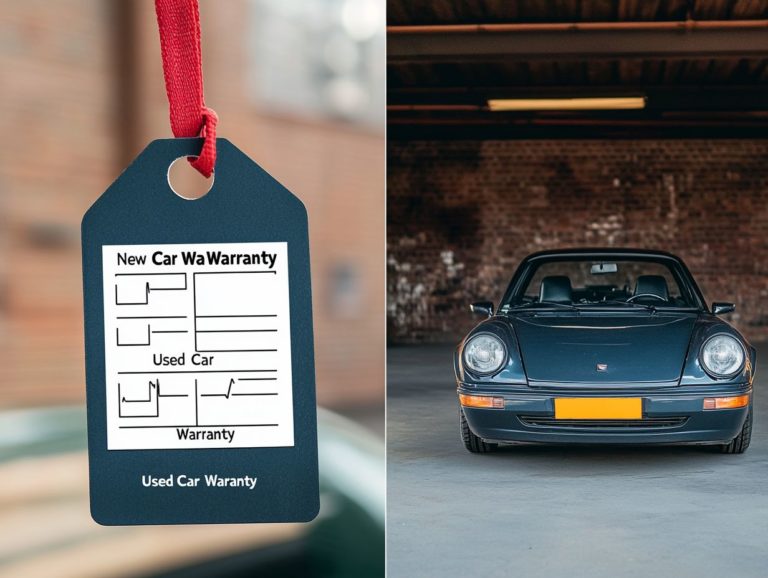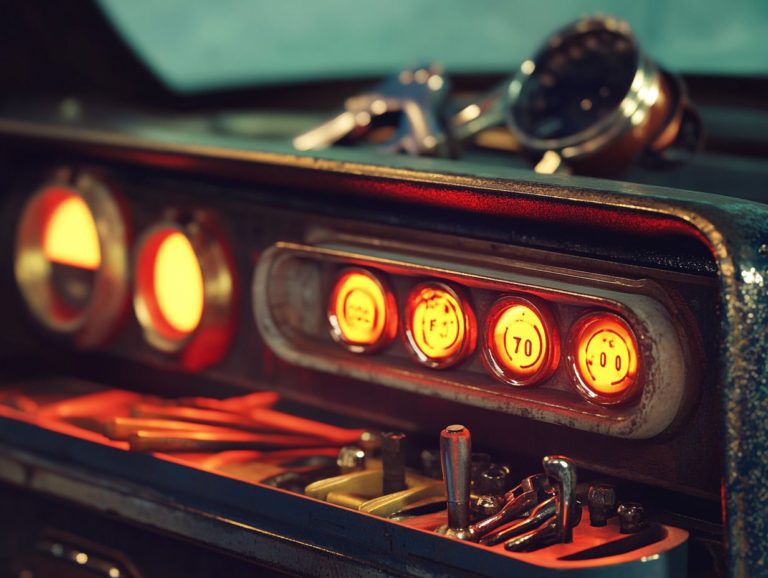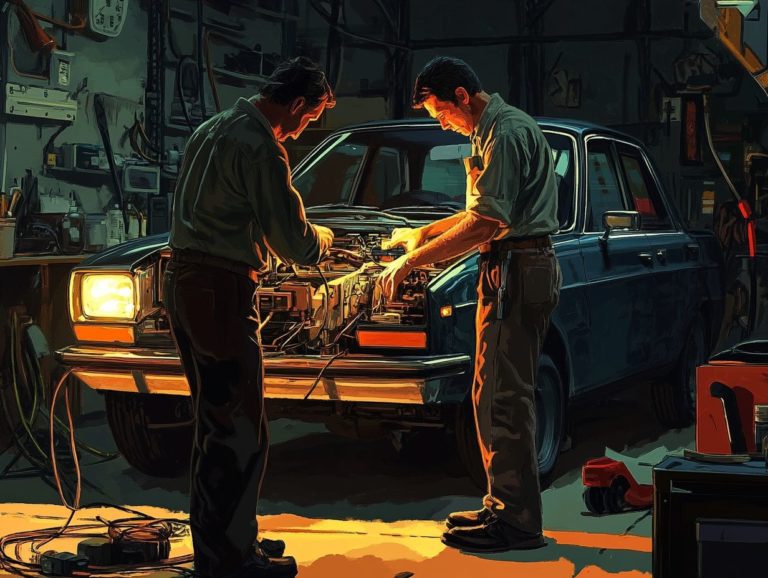5 Common Myths About Car Maintenance
Car maintenance can often feel like navigating a labyrinth, especially with the abundance of misinformation circulating out there.
Many drivers unknowingly hold on to myths that could lead to expensive mistakes and potential safety hazards. For instance, the notion that oil changes are only required every 3,000 miles or that premium gasoline is always the superior choice can seriously impact your vehicle’s performance.
Don t let myths steer you wrong! This article aims to unravel five common myths, shedding light on the truths that will keep your car performing at its best.
Contents
- Key Takeaways:
- 1. You Only Need to Change Your Oil Every 3,000 Miles
- 2. Premium Gasoline Is Better for Your Car
- 3. You Can Skip Regular Maintenance If Your Car Seems Fine
- 4. The Check Engine Light Only Comes On for Serious Problems
- 5. Changing Your Own Oil Is Always Cheaper
- What Are the Risks of Believing These Myths?
- How Often Should You Really Change Your Oil?
- What Are the Benefits of Using Premium Gasoline?
- Why Is Regular Maintenance Important for Your Car?
- What Are the Common Causes of the Check Engine Light Coming On?
- Is Changing Your Own Oil Always the Cheaper Option?
- What Are Some Other Common Myths About Car Maintenance?
- How Can You Make Sure You Are Properly Maintaining Your Car?
- Frequently Asked Questions
Key Takeaways:
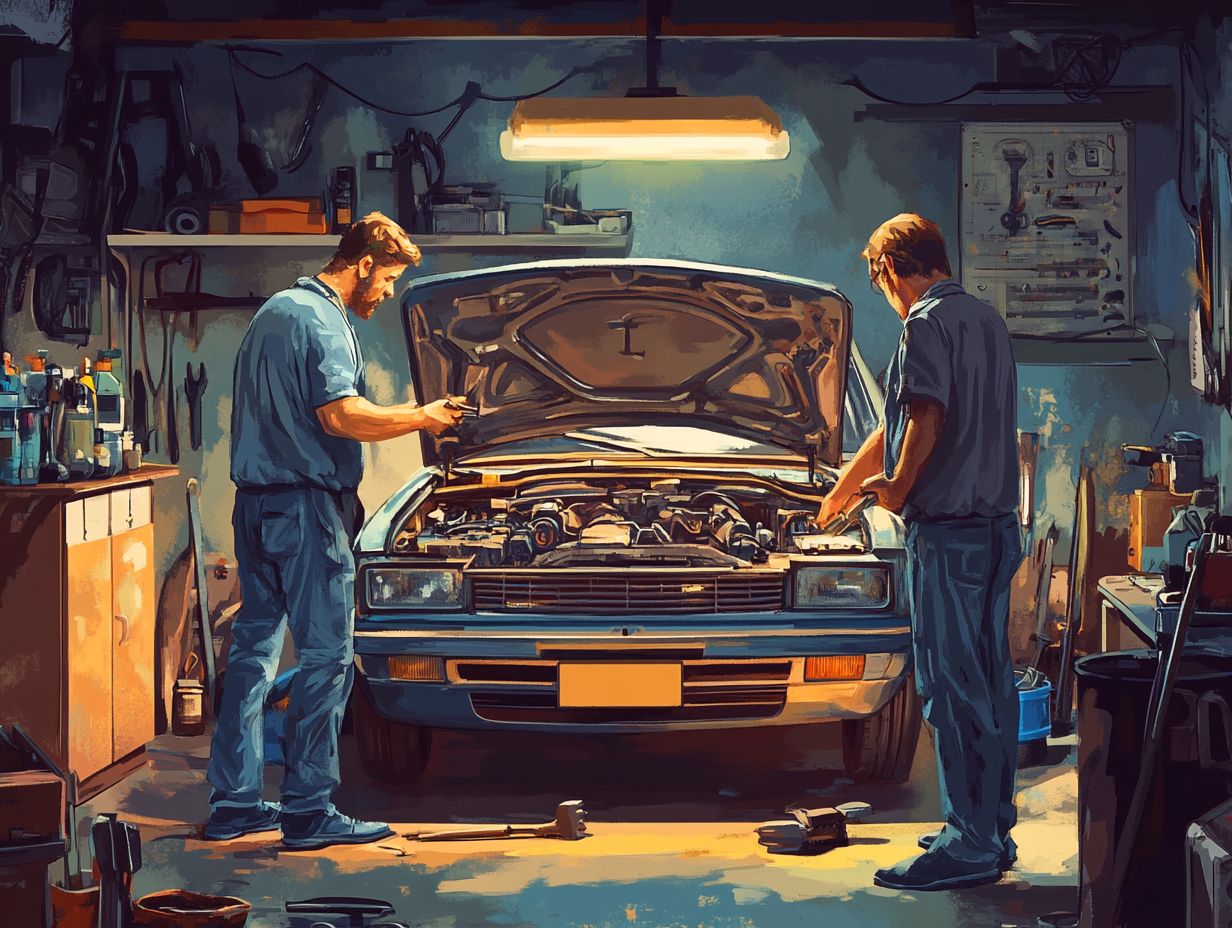
- Follow your car s maintenance schedule for optimal performance, not just the 3,000-mile rule.
- Check your manual to see if premium gas is really necessary; it may just be a waste of money.
- Stick to a regular maintenance schedule to avoid costly repairs later.
1. You Only Need to Change Your Oil Every 3,000 Miles
The common belief that you should change your engine oil every 3,000 miles is a myth that could lead to significant car problems and escalating maintenance costs over time. To debunk this and other misconceptions, check out the top 5 leasing myths busted for new car buyers.
Modern engines often require oil changes based on advanced oil technology and the manufacturer s recommendations outlined in your owner’s manual. Understanding the nuances of proper maintenance schedules is essential.
With advancements in oil formulations, particularly synthetic oils, the intervals for oil changes have evolved dramatically, allowing for longer durations between changes. These synthetic blends deliver superior performance, boasting higher resistance to breakdown under extreme temperatures and enhanced protection against wear.
The oil’s viscosity is crucial, as it influences how effectively it flows under various operating conditions. Automotive technicians play a vital role in this process. They assess the oil s condition beyond just mileage, taking into account factors like engine load and driving habits.
This ensures that your vehicle operates efficiently while extending its engine life.
2. Premium Gasoline Is Better for Your Car
Many people assume that filling up with premium gasoline will enhance their car’s performance. However, unless your vehicle’s owner s manual explicitly recommends premium fuel, opting for it can often be unnecessary and may not provide significant improvements in fuel economy or efficiency.
This misconception frequently arises from a misunderstanding of octane ratings a measure of fuel’s ability to resist knocking and their effects on modern engines. Premium gasoline generally boasts a higher octane rating usually around 91 or higher compared to regular options that typically range from 87 to 89.
For vehicles engineered for high-performance driving or those equipped with turbocharged engines, using premium fuel can indeed help prevent knocking and optimize performance. However, for the average driver with a standard vehicle, the advantages of premium fuel often fail to justify the additional cost.
Most engines operate efficiently on regular gasoline. Understanding when premium is genuinely beneficial enables you to make informed choices at the pump.
3. You Can Skip Regular Maintenance If Your Car Seems Fine
Believing you can skip regular maintenance just because your car seems fine is a risky mindset that can lead to serious safety issues and expensive repairs.
Regular upkeep, including safety inspections and checks of critical systems, is essential for effective vehicle ownership and optimal performance.
Automotive technicians stress that overlooking simple tasks, like checking tire pressure, can compromise handling and heighten the risk of tire blowouts. Likewise, neglecting to replace air filters can diminish engine efficiency and overall fuel economy.
Regular oil changes are vital to prevent engine wear and potential breakdowns. Consistent maintenance not only keeps your vehicle running smoothly but also safeguards essential safety features such as anti-lock braking systems and traction control from malfunctioning.
By adhering to a maintenance schedule, you can enhance your vehicle’s longevity and significantly reduce the risk of unforeseen accidents or breakdowns.
4. The Check Engine Light Only Comes On for Serious Problems
Many drivers think the check engine light only signals serious issues, but that’s not the whole story. The check engine light can indicate a wide range of problems from minor glitches in the electrical system to potential power loss that requires immediate attention.
It can light up for something as trivial as a loose gas cap or something more complex, such as failing sensors or spark plugs. Overlooking this warning could lead to serious complications, like engine misfires, excessive emissions, or even costly transmission fluid leaks.
That s why timely diagnostics are essential. Ignoring this warning could turn minor annoyances into major repairs, affecting your vehicle’s performance and your safety on the road. Make regular checks a priority to ensure your vehicle runs smoothly!
5. Changing Your Own Oil Is Always Cheaper
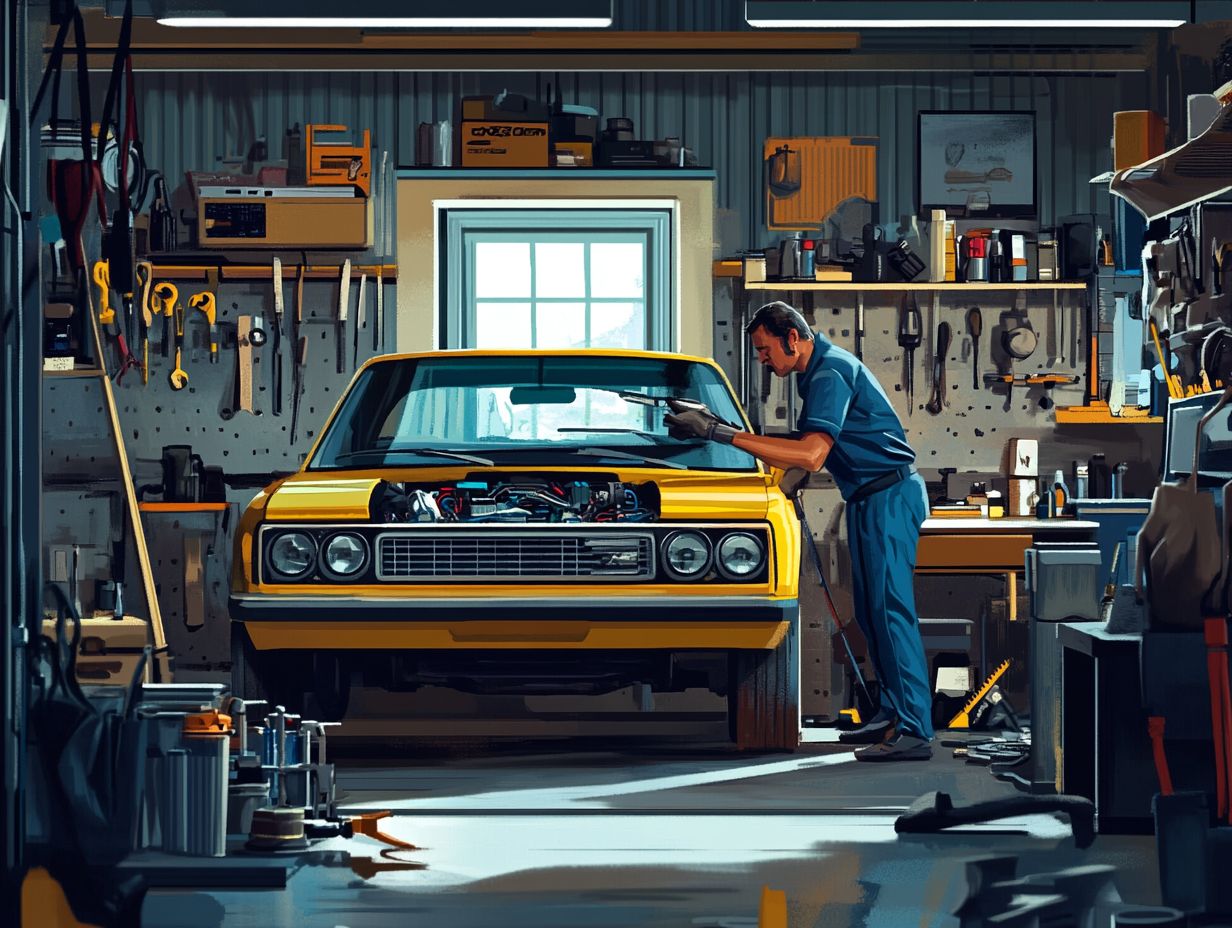
While changing your own oil might seem like a budget-friendly option, it s essential to consider the realities. The cost of good synthetic oil, the tools you’ll need, and the risks associated with improper handling can often make a professional oil change by an automotive technician a more reliable and economical choice.
If you re a DIY enthusiast, you’ll need to factor in the considerable time investment, especially if you lack experience or don t have access to the right equipment. Some might suggest using conventional oil to save a few bucks, but the advantages of synthetic oil like improved engine performance and a longer lifespan often justify the initial cost.
Improper oil changing techniques can lead to risks that might result in expensive repairs and jeopardize your vehicle s long-term health. By carefully weighing these pros and cons, you’ll be better equipped to make informed decisions that ensure your car runs smoothly and efficiently.
What Are the Risks of Believing These Myths?
Believing automotive myths can significantly jeopardize both your vehicle’s longevity and your safety on the road. Misconceptions about car maintenance, such as how often to change your oil, can lead to poor mechanical performance and inflated repair costs. To avoid these pitfalls, consider these 5 essential tips for common car maintenance.
Neglecting regular maintenance tasks, such as tire rotations and fluid checks, often stems from these false beliefs, which can culminate in brake failures or overheating engines. For example, if you subscribe to the myth that all vehicles require synthetic oil, you might overlook crucial oil changes altogether, putting your engine at serious risk of damage.
Always rely on trustworthy sources to get the facts! Credible information from consumer surveys and expert opinions from seasoned mechanics can enable you to make informed decisions, ultimately saving you from costly repairs and ensuring your safety on the road.
How Often Should You Really Change Your Oil?
Determining how often you should change your oil hinges on several factors, such as the type of engine oil you use, your driving conditions, and the manufacturer s recommendations in your owner s manual. Many modern engines typically require oil changes every 5,000 to 10,000 miles when using synthetic oil.
If you find yourself driving in extreme temperatures whether hot or cold you might need to adjust your oil change intervals, as those conditions can accelerate oil breakdown. Frequent short trips or hauling heavy loads can also put extra strain on your engine, making it necessary to change the oil more regularly.
While your owner s manual provides a reliable guideline, don t overlook the impact of your individual driving habits. Consulting with an automotive technician can give you personalized advice, ensuring that your vehicle runs smoothly and efficiently for years to come.
What Are the Benefits of Using Premium Gasoline?
Using premium gasoline can bring you a range of benefits, especially if your vehicle is designed to thrive on higher octane levels, which help prevent engine knocking. You might notice improved engine performance and optimal fuel efficiency. Additionally, you may even see better mileage.
However, it’s essential to weigh these advantages against current gas prices and your vehicle’s specific requirements.
For high-performance vehicles like sports cars and luxury sedans, premium fuel is often necessary to meet engineered specifications. These cars frequently feature turbocharging, a method that boosts engine power, and high-compression engines that thrive on higher octane ratings. This helps prevent engine knock and ensures a smoother ride.
Even some standard models may show enhanced performance when fueled with premium, particularly in challenging conditions like towing or navigating steep inclines.
The rising cost of premium gasoline can make you think twice about whether those performance gains are worth the extra expense. Understanding your vehicle’s unique needs and the financial implications of your fuel choices is crucial for making informed decisions that align with your driving experience.
Why Is Regular Maintenance Important for Your Car?
Regular maintenance keeps your car running smoothly and safely! By following a maintenance schedule and promptly addressing any issues with the expertise of an automotive technician, you can prevent costly repairs and enhance mechanical performance.
Not only does regular upkeep extend your vehicle’s lifespan, but it also safeguards critical systems like brakes, tires, and suspension. Routine tasks such as changing the oil, checking fluid levels, and inspecting brake pads help ensure optimal functionality.
By regularly assessing these components, you minimize the risk of unexpected breakdowns and enhance your overall safety on the road.
Periodic tire rotations and alignments contribute to better fuel efficiency. Timely air filter replacements can improve the air quality inside your vehicle. These maintenance measures create a more reliable driving experience and could even lead to a better resale value in the future.
What Are the Common Causes of the Check Engine Light Coming On?
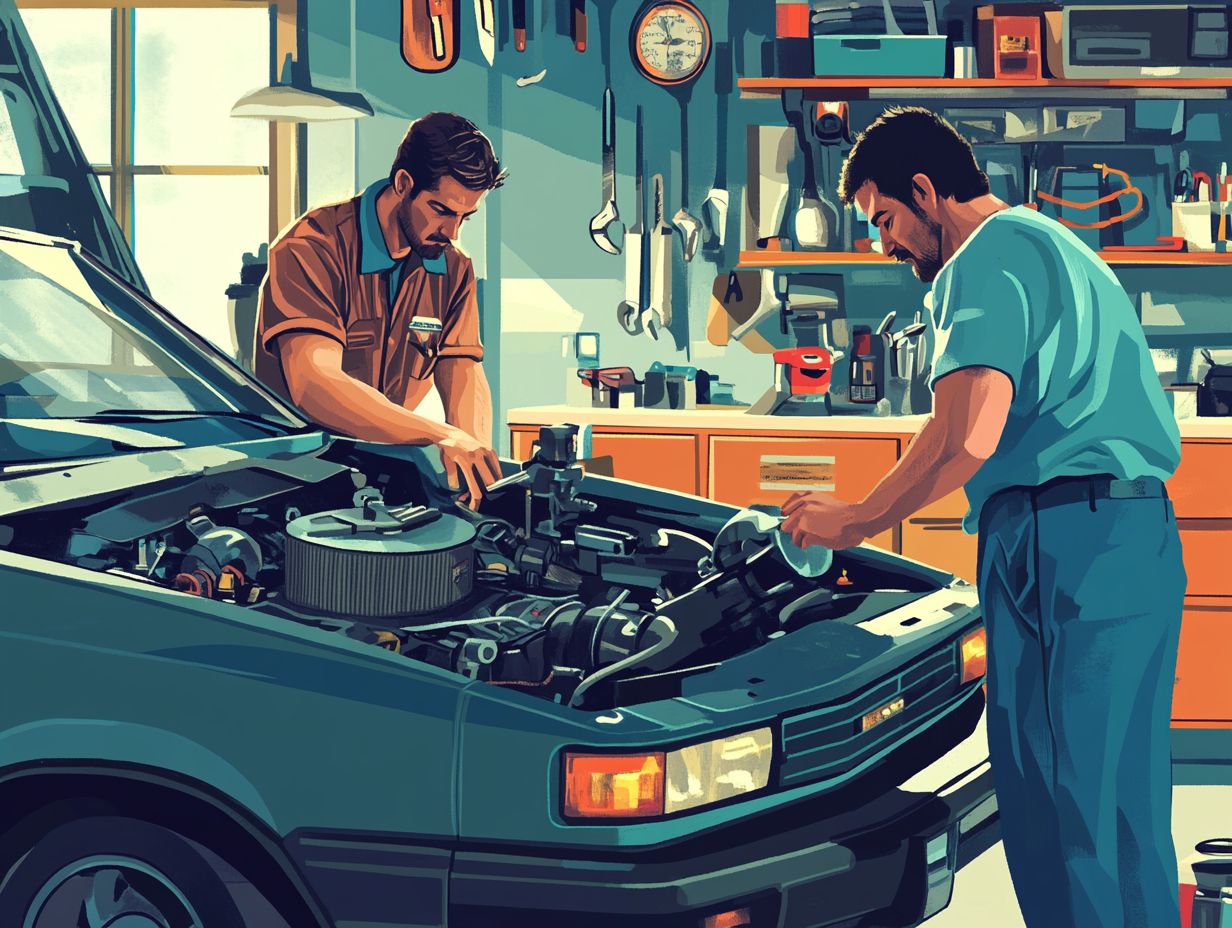
A check engine light can illuminate for a variety of reasons from electrical system hiccups to low transmission fluid or even minor sensor glitches. When you see that light, it s a clear signal that a visit to an automotive technician is essential to diagnose and address the underlying cause of potential power loss.
Common culprits for the check engine light include:
- A loose gas cap, which allows fuel vapors to escape,
- A malfunctioning O2 sensor that disrupts your vehicle’s emissions.
Ignoring this warning could lead to more serious issues, such as decreased fuel efficiency or even engine damage.
When confronted with this light, the typical diagnostic process kicks off with a code reader that identifies specific trouble codes linked to the problem. This helps technicians pinpoint the issue with precision. It s vital to address these concerns promptly; delaying repairs can spiral into more complicated and costly fixes down the road.
Is Changing Your Own Oil Always the Cheaper Option?
While changing your own oil might seem like a budget-friendly option at first glance, several factors could tip the scales in favor of professional oil changes by an automotive technician. Consider the cost of quality synthetic oil, the necessary tools, and the risk of costly mistakes. Opting for a pro can be a more cost-effective and safer choice in the long run.
Think about the initial investment in tools you’d need for a DIY approach oil wrenches, filters, and disposal containers quickly add up. Choosing the right type of oil to suit your engine’s specific requirements can be overwhelming. One misstep could lead to voided warranties or engine troubles. In contrast, professionals are trained to navigate these complexities with ease, saving you the headache of potential mishaps.
Ultimately, while the prospect of saving money by tackling it yourself is tempting, it’s essential to weigh these considerations against the convenience and peace of mind that come from expert service.
What Are Some Other Common Myths About Car Maintenance?
Automotive myths are all around you. Common misconceptions, including those about electric vehicles, vary from the necessity of using fuel additives to misunderstandings about air conditioning usage and tire pressure management. To clear up some confusion, check out 5 myths about electric cars debunked.
These myths can harm your vehicle’s performance and lead to poor maintenance practices. For instance, take the notion that using premium fuel will always enhance your car’s performance; this is misleading. Most vehicles are designed to run efficiently on regular fuel, making higher octane an unnecessary expense. To avoid such misconceptions, check out these 5 tips for avoiding common car repairs.
Then there’s the belief that driving with the air conditioning off saves more fuel than it actually does. This can lead to discomfort without substantial savings. Properly managing tire pressure is another area where these myths can pose safety risks and reduce fuel efficiency.
By debunking these common repair myths, you not only enhance your vehicle’s longevity but also enable yourself to make informed decisions about its upkeep.
How Can You Make Sure You Are Properly Maintaining Your Car?
To ensure you re maintaining your car effectively, establish a maintenance schedule that aligns with the guidelines in your owner s manual. Don t forget to incorporate regular safety inspections and consult an automotive technician for any specific concerns you might have.
Consider creating a detailed maintenance log to track routine services like oil changes, tire rotations, and brake inspections. Understanding key components, such as the engine (the part of the car that helps it run), transmission (which helps it change gears), and braking system, is essential. This knowledge will help you identify when something isn t quite right.
Recognizing signs that indicate a need for professional assistance like unusual noises or warning lights on the dashboard can save you from minor issues snowballing into costly repairs.
By taking these proactive steps, you ll not only enhance the longevity of your vehicle but also optimize its performance.
Check out this video to learn more about car maintenance myths!
Frequently Asked Questions
What are the most common myths about car maintenance?
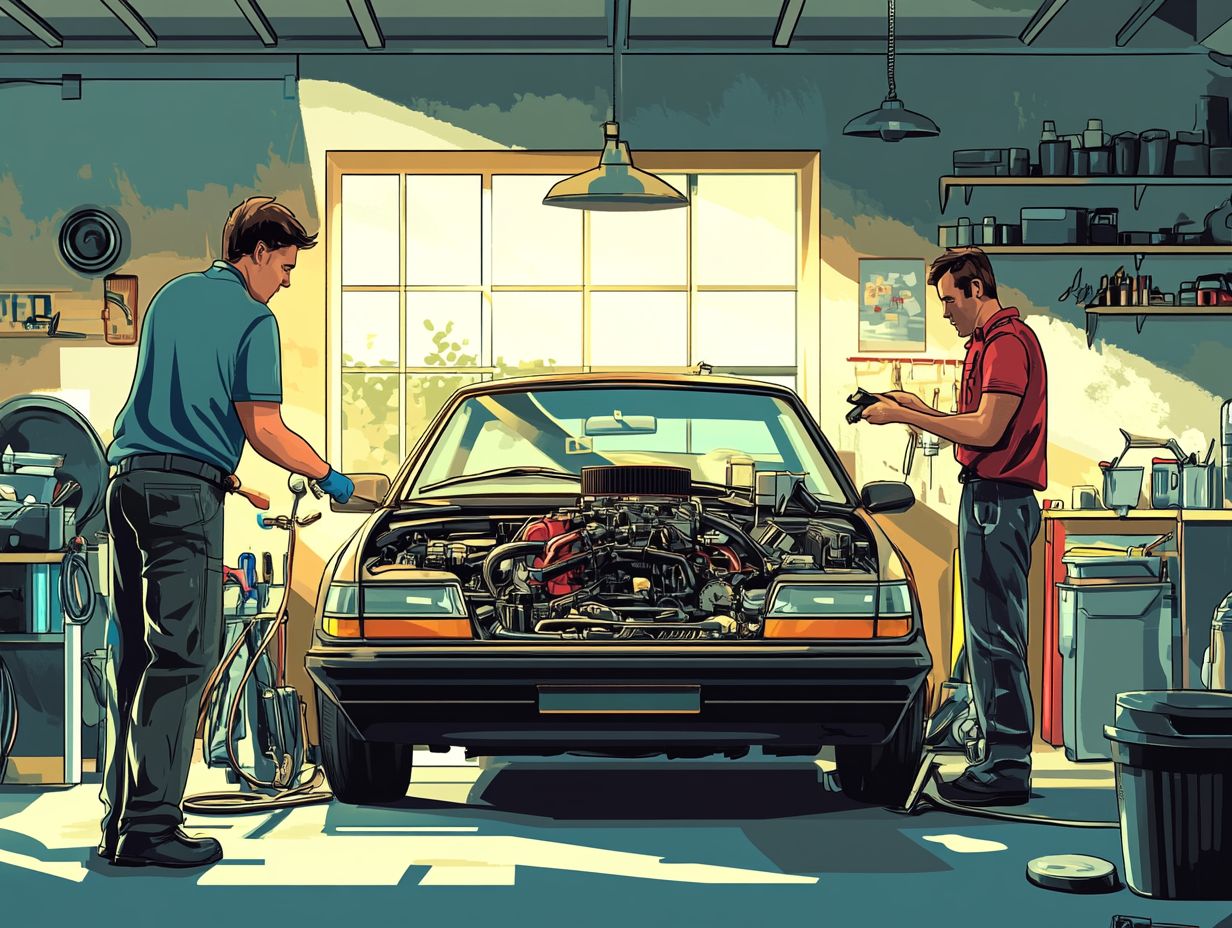
- Using premium gas is better for my car.
- You only need to change your oil every 3,000 miles.
- Letting your car idle to warm up is necessary.
- All tires should be inflated to the same pressure.
- Regular maintenance is not necessary for newer cars.
No, unless your car’s manufacturer specifically recommends it. Most cars are designed to run on regular gasoline, and using premium gas will not provide any extra benefits.
How often should I change my oil?
It is recommended to change your oil every 5,000-7,500 miles. Some newer cars may be able to go longer between oil changes, but it is still important to follow your manufacturer’s recommendations.
Do I need to let my car idle to warm up?
No, this is actually harmful to your car’s engine. The best way to warm up your car is to drive it at a moderate speed, which will allow the engine to reach its optimal temperature and reduce wear and tear.
Should all tires be inflated to the same pressure?
No, the correct tire pressure can vary depending on the make and model of your car. Always refer to your owner’s manual for the recommended tire pressure and make sure to check and adjust it regularly.
Is regular maintenance necessary for newer cars?
Yes, even newer cars require regular maintenance to keep them running smoothly and prevent any potential problems. Always follow your manufacturer’s recommended maintenance schedule to ensure your car’s longevity.



